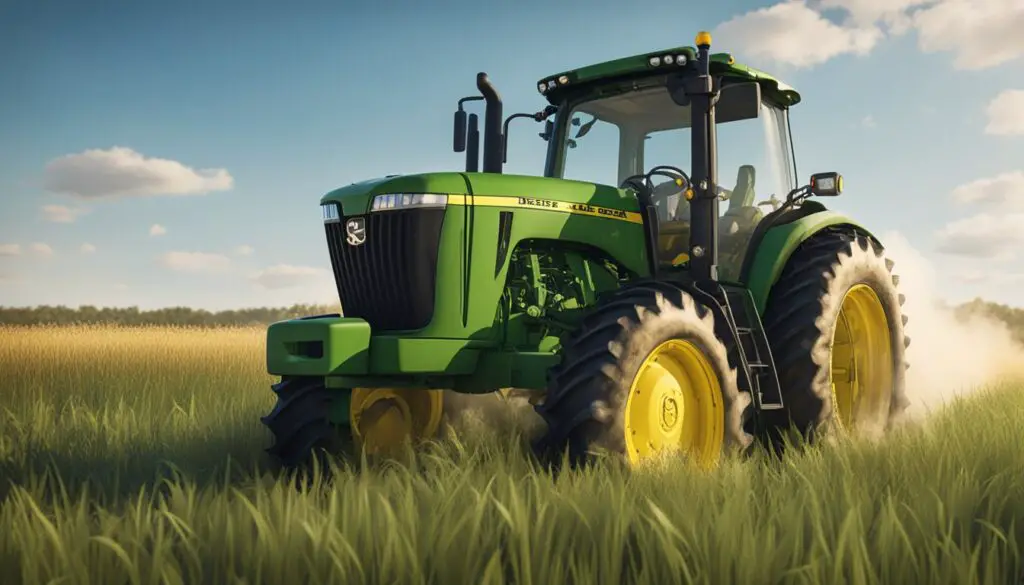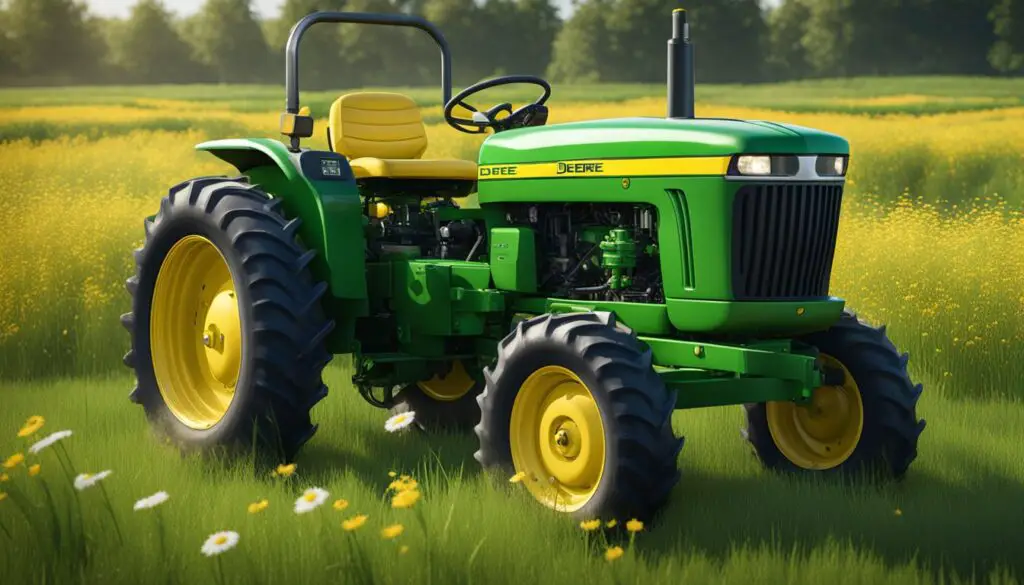The John Deere 3038E compact tractor is a popular choice among farmers and landowners for its versatility and power in a compact size. With its user-friendly interface and reliable performance, it facilitates a multitude of tasks from mowing to tilling. However, like any frequently used machinery, the 3038E is not without its common issues. To keep your tractor running smoothly, it’s essential to be aware of the typical problems that can arise.

Recognizing the challenges with the John Deere 3038E can save you time and money on repairs and maintenance. Some of the issues you might encounter include engine performance hiccups, hydraulic and electrical system malfunctions, steering complications, and transmission glitches. These problems can often be remedied with a blend of timely troubleshooting and regular maintenance, ensuring that minor issues don’t escalate into major setbacks.
Key Takeaways
- Understanding your tractor’s common issues can help prevent downtime.
- Regular maintenance is key to keeping your John Deere 3038E in optimal condition.
- Stay informed on how to troubleshoot issues to manage repairs swiftly.
Common John Deere 3038E Problems Overview
When caring for your John Deere 3038E, it’s good to stay ahead of common issues. Regular maintenance will help mitigate many of these problems, but being aware of them means you can tackle them early on.
Engine Issues
Your 3038E’s Yanmar diesel engine can face several problems, such as stalling or difficulty starting. These are often linked to air and fuel delivery or spark plug issues. Keeping an eye on your engine’s state can prevent these typical engine problems.
Electrical Challenges
The electrical system of the tractor is vital for starting the engine and powering lights. If you’re facing dim lights or starting problems, check your battery and alternator. Electrical system troubleshooting may be needed if these components are functioning correctly.
Fuel System Faults
Your engine’s performance relies heavily on a well-maintained fuel injection system. Common troubles include clogged fuel filters and issues with the fuel injection pump. Regularly replacing the fuel filter and ensuring high-quality diesel use are indispensable for smooth operation.
Hydraulic System Concerns
The hydraulic system is essential for the tractor’s functionality. Watch out for leaks, low hydraulic oil levels, or malfunctioning hydraulic cylinders. Hydraulics troubleshooting might involve checking the hydraulic lines and ensuring proper hydraulic pump operation.
Transmission Troubles
Transmission issues can hamper your tractor’s ability to move efficiently. From verifying correct transmission fluid levels to examining the hydrostatic transmission for responsiveness, keeping these components in check is key for a steady ride.
Power Steering and Control Issues
If steering your tractor feels harder than usual, it could be a sign of power steering problems or an issue with the control valve. Regular checks can help avoid these operational hiccups.
Cooling System Complications
To dodge overheating, ensure your cooling system is in top form. This means monitoring the radiator and maintaining a proper coolant level.
PTO and Hitch Hang-Ups
The Power Take-Off (PTO) and 3-point hitch are prone to issues that can affect your tractor’s versatility. Whether it’s a hitch refusing to stay in position or a PTO not engaging, addressing these early ensures your attachments work when you need them.
Tire and Brake Maintenance
Lastly, consistent checks on tire pressure and the condition of your wet disc brakes will provide a safer and smoother operation. Keeping the front tires especially well-maintained is crucial due to their pivotal role in steering and stability.
Preventative Maintenance and Best Practices
Staying ahead of equipment issues with your John Deere 3038E starts with a robust routine maintenance schedule. It’s essential to pay attention to every part of your tractor to ensure reliability and longevity.
Routine Check-Ups
Knowing your tractor’s schedule for regular maintenance is key. Check your operator’s manual for specific intervals to examine your air filter and oil filter. A clean air filter ensures efficient engine operation, while regular oil filter changes keep the engine free from contaminants.
Proper Fluid Management
Fluid levels are the lifeblood of your tractor’s performance. Maintain coolant level, hydraulic fluid, transmission fluid, and clutch fluid to prevent issues like overheating or inadequate hydraulic power. Remember, using the wrong fluids or inadequate levels can cause significant damage.
- Coolant: Check coolant level regularly
- Transmission & Hydraulic Fluid: Monitor for low levels and replace clogged fluid filters as needed
- Clutch Fluid: Ensure adequate level to prevent clutch wear
Seal and Hose Inspections
Inspect all seals and hoses periodically for signs of wear or damage, such as cracks or leaks. A failing valve seal can lead to pressure loss and system malfunction. Replace any compromised component to avoid unexpected downtime.
- Seals: Look for leaks or brittle appearance
- Hoses: Check for abrasions, soft spots, or bulges
Tire Pressure and Tread Checks
Maintain the correct tire pressure on both the front and rear tires to avoid uneven wear and ensure optimal traction. Also, inspect the tread for signs of wear or damage. Properly inflated and maintained tires contribute to better fuel efficiency and overall tractor performance.
Tire Maintenance:
| Tire | Check |
|---|---|
| Front Tires | Ensure proper pressure and no cracks |
| Rear Tires | Inspect tread depth and wear patterns |
Battery and Electrical Care
Your tractor’s battery and electrical system need regular checks. Ensure your battery terminals are clean and secure, and the battery is fully charged. A well-maintained electrical system prevents starting issues and unwanted electrical failures.
- Battery: Check for a secure fit and no corrosion
- Electrical System: Ensure all connections are solid and wires are intact
Frequently Asked Questions

When dealing with your John Deere 3038E tractor, it’s common to have questions about its operations and maintenance. This section aims to address some of the most frequently asked questions to assist you with your tractor’s upkeep and performance challenges.
What are common issues with the electrical system in a John Deere 3038E?
You might encounter electrical system issues such as a dead battery or faulty glow plugs. Implementing regular maintenance checks can help prevent these problems.
How does the John Deere 3038E perform with heavy loader work?
The John Deere 3038E is capable of managing heavy loader work, but like any machinery, pushing it beyond its limits may lead to increased wear and tear.
Are there any recurring transmission problems in the 2018 or 2021 John Deere 3038E models?
Some owners have reported transmission overheating in both the 2018 and 2021 models, especially under heavy use. Periodic fluid checks and replacements are crucial for preventing transmission issues.
What should I know about the durability of the engine in a John Deere 3038E?
The engine of the John Deere 3038E is generally durable but requires consistent maintenance to avoid common issues such as dirt buildup which can impede performance.
What maintenance challenges might I face with a John Deere 3038E tractor?
Regular maintenance challenges include addressing clogged filters and ensuring proper hydraulic fluid levels to avoid mechanical hiccups.
How do the features of John Deere 3038E compare to the 3039R in terms of performance?
The John Deere 3038E, while robust, has a slightly less powerful engine compared to the 3039R, which may lead to different performance levels when handling demanding tasks.

Leave a Reply